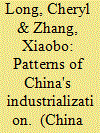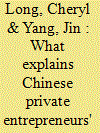|
|
|
Sort Order |
|
|
|
Items / Page
|
|
|
|
|
|
|
| Srl | Item |
| 1 |
ID:
147438


|
|
|
|
|
| Summary/Abstract |
To study how firms respond to minimum wage regulation in China, this paper empirically explores a number of dimensions along which firms adjust in response to minimum wage differences, using three waves of a national survey of Chinese private firms. Consistent with the predictions of economic theory, we find that private firms in China respond to minimum wage increases by cutting various fringe benefits such as pension and insurance, and by laying off low-skilled workers and short-term workers. Despite these adjustments, firms cannot fully mitigate the detrimental effects on firm profitability when faced with adverse demand shocks because of the wage rigidity introduced by minimum wage regulation. These findings highlight the unintended consequences of minimum wage regulation on the private sector in China.
|
|
|
|
|
|
|
|
|
|
|
|
|
|
|
|
| 2 |
ID:
170344


|
|
|
|
|
| Summary/Abstract |
Using a unique data set of Chinese foreign direct investment (FDI) contracts from the 1980s and early 1990s, we explore those mechanisms of historical persistence resulting from China's unique colonial experience. Adopting difference-in-differences as well as difference-in-difference-in-differences analysis within conditional logit, we provide evidence that foreign investors favored locating FDI in Chinese cities in which their home country had a colony in the 19th century and that a human-capital channel best explains this persistent impact of colonial experience. While alternative explanations for long-term persistence are not consistent with the empirical findings, the results suggest that legal human capital inherited from colonial times affected economic decisions after 1978. Thus, we attempt to advance the literature on history's long-lasting influence by proposing one particular mechanism of persistence—memory of legal institutions, or inheritance of legal human capital.
|
|
|
|
|
|
|
|
|
|
|
|
|
|
|
|
| 3 |
ID:
128156


|
|
|
|
|
| Publication |
2012.
|
| Summary/Abstract |
This paper presents a few stylized facts on the patterns of China's industrialization by computing a set of multi-dimensional measures on industrial concentration, regional specialization, and clustering based on census data at the firm level in 1995 and 2004. Our results show that China's rapid industrialization is characterized by the following patterns: industries have become more spatially concentrated; regions have become increasingly specialized; and firms have become more interconnected, both within industries and within regions. In addition, the number of firms is growing faster in clustered areas than non-clustered ones. Together these patterns suggest that China's industrialization process is largely cluster-based-a phenomenon in which a large number of highly interconnected firms are located within a well-defined geographic region.
|
|
|
|
|
|
|
|
|
|
|
|
|
|
|
|
| 4 |
ID:
103904


|
|
|
|
|
| Publication |
2011.
|
| Summary/Abstract |
The promotion tournament as a potentially important incentive mechanism for top management in transition economies has not been examined by the literature on managerial incentives. This paper attempts to fill this important gap in the literature. The paper begins with modifying the empirical predictions previously-derived from the tournament theory to the context of transition economies in which state ownership still plays a significant role in publicly-traded firms. Specifically, we test the following two hypotheses. First, the winner's prize will need to increase in order to prevent each contestant from lowering his/her effort level in the face of a larger contestant pool. Such an optimal response of the winner's prize to the size of the contestant pool is more evident for China's listed firms that are less controlled by the state. Second, the winner's prize will also need to rise in order to prevent each contestant from reducing his/her effort level in the face of greater market volatility (or more noise in the performance measure used to determine the tournament winner). Using comprehensive financial and accounting data on China's listed firms from 1998 to 2002, augmented by unique data on executive compensation and ownership structure, we find evidence in support of both hypotheses. Finally, we also find evidence suggesting that an increase in the winner's prize will result in improved firm performance due to enhanced managerial effort, and that the performance effect of the winner's prize is greater for China's listed firms that are less controlled by the state. As such this paper provides yet another piece of evidence that ownership restructuring may be needed for China to successfully transform its SOEs to efficient modernized corporations and reform its overall economy.
|
|
|
|
|
|
|
|
|
|
|
|
|
|
|
|
| 5 |
ID:
147611


|
|
|
|
|
| Summary/Abstract |
This paper studies Chinese private entrepreneurs' charitable behaviors by exploring the dynamic reciprocal relationship between private firms and local governments. By using three waves of a nationwide survey of private firms in 2002, 2004 and 2006 from China, we provide robust evidence that Chinese private entrepreneurs with access to preferential loans from state-owned banks when their businesses first started are more likely to participate in donation and anti-poverty programs organized by the government, and the effects of such loans are more pronounced for small firms and firms in regulated industries. Furthermore, we find that this reciprocal relationship between local governments and private entrepreneurs is a personal relationship rather than an institutional relationship, which declines in importance in areas with better legal institutions and in regions with change of local leadership. Finally, there is evidence that Chinese private entrepreneurs' charitable behaviors are also motivated by political returns and other individual characteristics.
|
|
|
|
|
|
|
|
|
|
|
|
|
|
|
|
|
|
|
|
|